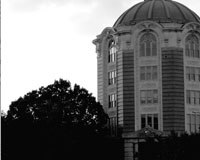
Decimation
Making Confession
Before the Apocalypse, Sentries Abandon Post
When God gets angry, he goes all out.
There’s no come-to-Jesus meeting
in Genesis, just rain—lots of rain, until
everyone drowns in their sin. No mystery
as to why—God makes it clear:
The earth is corrupt and full of violence.
Noah is spared, with two of each creature
and a bunch of clean animals for sacrifice.
The rainbow after the flood doesn’t promise
safety— only that next time, the world won’t end
with water. There are so many ways to die.
The Book of Numbers is a warning—
poisonous snakes feast on dissidents;
fire falls from the sky; the earth opens its mouth
to swallow rebels; plague after plague
consumes Israel until she complies.
In 471 BC, the Roman Republic uses decimation
for punishment. Consider it a perverse tithe,
offering the unclean as sacrifice to save the rest—
it makes sense. We can’t afford annihilation.
They say decimation isn’t used anymore
despite rumors during the Great War,
but Life has a way of keeping us in line.
I think of family, this cohort marriage made
for me, and try to decide which of us
drew the shortest straw. Sadie, bludgeoned
to death by cancer? Maybe Doug, stoned
on Ambien and Clonazepam. Or the ex-wife,
raising a child alone. Think of the soldier
who survives to see a tenth of his unit
executed for the same crime he committed.
Is it luck that we are spared? We get to keep
living, ever as dead as the ones picked to die.
Only in the doctor’s office
will I tell a complete stranger
what sex feels like.
Shed my shyness like skin, let her in
gloved and gentle—
hold my breath tight in a cocoon
of fear, jaw and body clenched
against new pain.
Until she says breathe and
suddenly it’s the last day of school
before summer
before white sand
before Longboat Key
before the kite flies high in the breeze.
I sink into the table, held to earth
by stirrups—too tired to gallop
away from diagnosis, to untangle
kite tails knotted in trees, to protect
butterfly wings from hands
too eager to touch.
Before the Apocalypse, Sentries Abandon Post
Supposedly, we all have an editor in our head—clicking backspace, altering the script. Somebody always on the lookout. So I wonder where the guardian angel was when God created the locust and the termite, the mosquito. Nobody said a word. They just let him do his thing, watched as he proclaimed it was good, even though he knew what would happen to Pharaoh and to my grandmother’s house; how many people would die from malaria.
And I wonder where the angel was a decade ago when I said I do. Nobody tried to stop me from walking down the aisle, not even when the preacher gave the crowd a final chance. Where is the censor now when Mother tells me to put on lipstick—You really need some color in your face. Horizontal stripes are for smaller girls. That hairstyle does you no favors.
If God ever looks at Earth from his celestial throne, he doesn’t see green and blue melded hues—beautiful lies the satellites send us from space. The whole planet is a giant plumber, bent over hard at work, trying to fix pipes that broke in the Flood. And we’re just tiny drops of sweat, proof of labor, rolling insignificantly from one part of the world to another, hoping something will save us from being wiped away.
An editor and writer for various companies since 1999, Marissa Glover now teaches writing at Saint Leo University. Marissa is also the founder of the Friday Night Open Mic event series, co-editor for Orange Blossom Review, and a senior editor at The Lascaux Review. Marissa’s debut poetry collection, Let Go of the Hands You Hold, is forthcoming from Mercer University Press in spring 2021. You can follow her on Twitter @_MarissaGlover_ .

